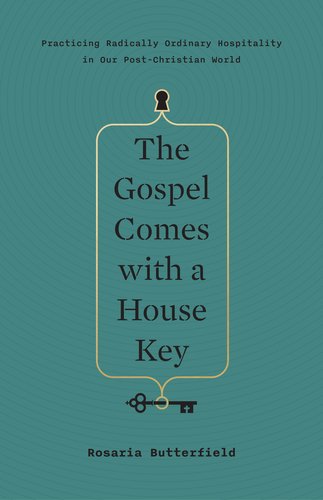A Brief Book Summary from Books At a Glance
By Jeff Block
Introduction
The Gospel Comes with a House Key is a clarion call to what the author calls “radically ordinary hospitality.” The book is written by Dr. Rosaria Butterfield who believes this kind of hospitality is the obligation and potential joy of every Christ-follower. It is the “basic building block for vital Christian living” (220).
From cover to cover, Butterfield calls her readers “to invite strangers to become neighbors and neighbors to become family” (14). Her clearly-stated goal for the Western Church today is to show “this skeptical, post-Christian world what authentic Christianity looks like” (13), which she defines as “every day, Christ-centered table fellowship” (11). This book tells much of her story, takes us inside her home – which she views as “a hospital and an incubator” (94) – and her family, and presents us with an instructive and compelling glimpse of what life could be like if we loved our neighbors by simply and consistently inviting them into our lives.
About the Author
Rosaria Champagne Butterfield grew up in a highly dysfunction unbelieving family. In her twenties, after earning her PhD in English literature, she identified as a lesbian and became an outspoken atheist, feminist, and advocate for the LGBTQ lifestyle and related issues. Butterfield came to Christ as the result of the hospitality of a Christian couple whom she befriended while researching an article she intended to demonize the “Christian right,” and after reading the Bible extensively in preparation for that article. She is now married to Kent, a Reformed Presbyterian pastor in North Carolina, and is a homeschooling mother, author, and speaker.
Book Summary
Chapter 1: Priceless – The Merit of Hospitality
One of the primary characters in the book is Butterfield’s next-door neighbor Hank, who was arrested for cooking meth in his basement less than two years before this book was published. Butterfield’s call for Christ-like, gospel-proclaiming hospitality is woven throughout the book, side-by-side with the story of their relationship with this particular neighbor – from his originally-off-putting personal quirks through his arrest all the way to the family’s ongoing discipleship relationship with him in prison.
Butterfield introduces Hank and his arrest in this brief chapter, allowing her to refer back to this event throughout the book. She focuses on the role Christians should play in the community in circumstances like this one. “Who else but Bible-believing Christians can make redemptive sense of tragedy? Where else but a Christian home should neighbors go in times of unprecedented crisis?” (19).
Chapter 2: The Jesus Paradox – The Vitality of Hospitality
Jesus turns everything in this world upside down. Butterfield calls this “the Jesus Paradox.” She illustrates this truth with the adoption of one of their sons and in the way that Jesus dealt with lepers in the Gospels. Instead of recoiling from the contagion of their disease, He embraces the sick and infects them with grace and dignity. “Jesus meets you empty and leaves you full” (29). Therefore, “the Christian life is contagious grace” (30).
But this upside-down, paradoxical life is costly. “The gospel comes in exchange for the life we once loved” (30). Because the world distrusts us, for Christians to maintain an authentic gospel witness, we must “be transparently hospitable,” “live under the authority of God and church,” and “know who our neighbors are and how they struggle” (32). “The Christian home is the place where we bring the church to our neighbors, rather than expecting our neighbors to find their way to our churches” (33) – a place where neighbors can find safety and rest. This is expensive and inconvenient, but that is part of our commitment to die to self and be transformed into the image of Christ. “God calls us to make sacrifices that hurt so that others can be served and maybe even saved. We are called to die” (42). As Christendom passes away. . .
[To continue reading this summary, please see below....]The remainder of this article is premium content. Become a member to continue reading.
Already have an account? Sign In
